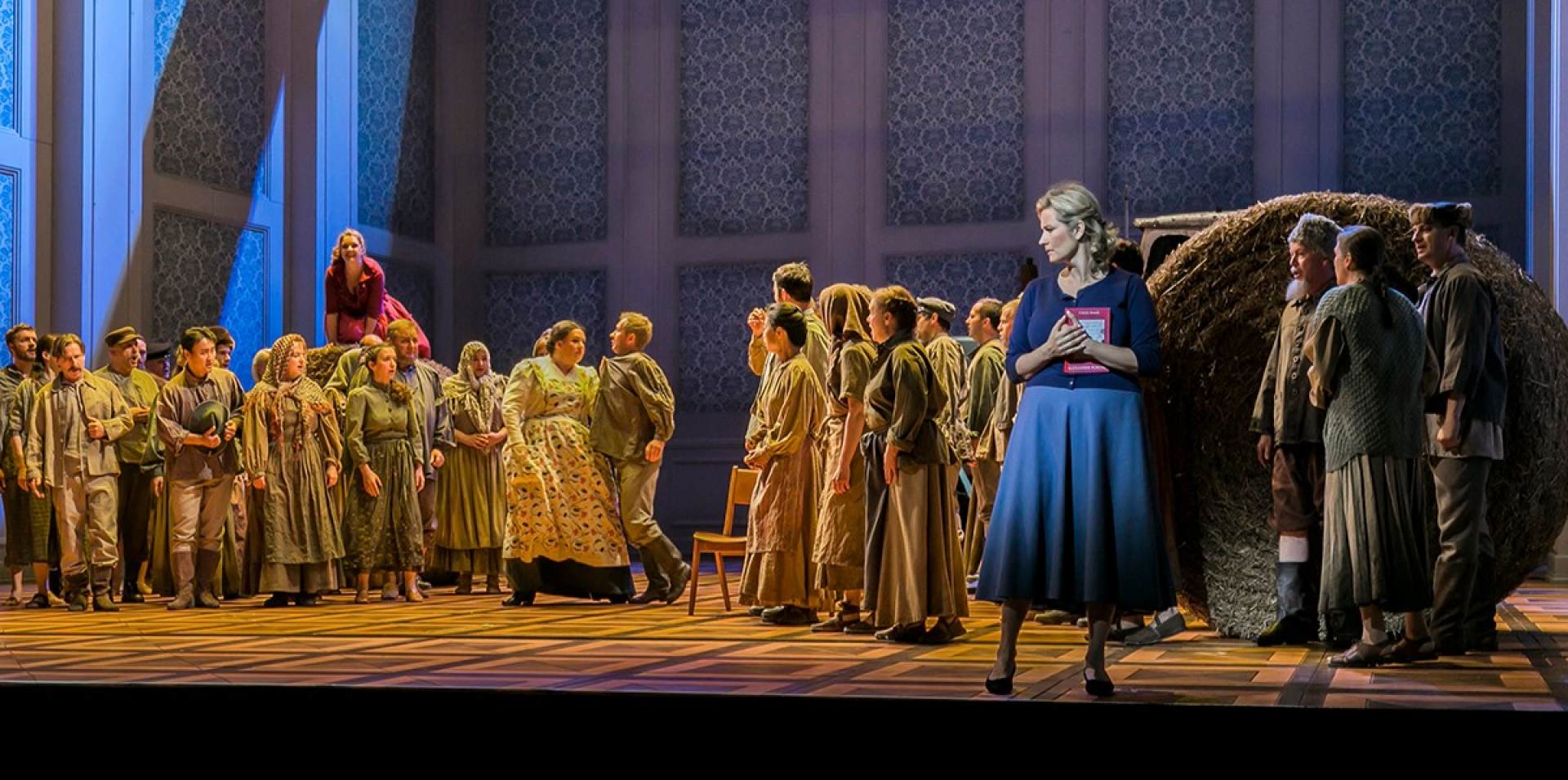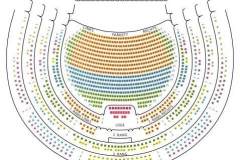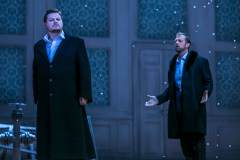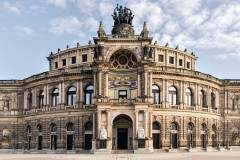Eugene Onegin
Mo | Tu | We | Th | Fr | Sa | Su |
Eugen Onegin - Pjotr I. Tschaikowsky
Lyrical scenes in three acts (seven scenes)
Libretto by Pyotr I. Tchaikovsky and Konstantin S. Schilowsky after the novel by Alexander Puschkin
Performed in Russian with German and English supertitles
Premiere: June 30, 2016
No other opera shows the torment and pain of lost love with such clarity.
Storyline
Scene one
An afternoon on the Larin country estate: nurse Filipievna is doing the housework whilst Madame Larina is again lamenting the introvert behaviour of her daughter Tatiana. She only wishes to read in peace but is always prevented from doing so by her mother – be it either with her lamenting her youth or the songs of the peasants who sing at Larina’s behest. Olga attempts to help her sister and tries to turn Tatiana’s mind onto other things. Then a visitor is announced: Olga’s betrothed, Lenski, introduces his new neighbour, Onegin. Whilst the family is irritated by the stranger’s behaviour which goes against all etiquette, his unconventional manner awakens the interest of Tatiana. Could he be her true love of which her books tell?
Scene two
Tatiana is too agitated to sleep. She asks Filipievna to tell her something about love but her story is not a happy one: she had to marry someone chosen by her parents. On her own, Tatiana starts to write a letter in which she confesses her love to Onegin. When Filipievna wants to wake up the girl the next morning she realises what happened during the night. Despite her initial hesitation, she cannot refuse Tatiana’s wish and takes the letter to give to Onegin.
Scene three
Impatiently and nervously, Tatiana awaits Onegin’s reaction. When he is finally standing in front of her, all her hope disappears: he coldly rejects her.
Scene four
It is Tatiana’s name day and the whole neighbourhood has met for a party. Whilst everyone is amusing themselves, Tatiana wishes she could just disappear and Onegin is also annoyed for having been dragged to the ball by Lenski. To take revenge on his friend and spurred on by the gossip of the guests, he starts to flirt with Olga in front of everyone. The situation escalates and Lenski challenges Onegin to a duel.
Scene five
Lenski is waiting for Onegin, who turns up late, with his second Saretzki. In remembrance of past years, Lenski bids farewell to his love and his life. When the friends are standing opposite one another shortly afterwards, as opponents, no-one can bring themselves to say the words of reconciliation. The duellers reach for their weapons, Onegin shoots and Lenski falls.
Scene six
The ghosts of the past haunt Onegin and, after many years of travel, he returns to St. Petersburg where he ends up going to a ball. Here the royal host Gremin proudly presents his wife who is none other than Tatiana. It suddenly dawns upon Onegin that he loved Tatiana the whole time and that he can only be happy with her.
Scene seven
The situation has reversed and now Onegin confesses his love to Tatiana in a letter but although she still loves him she rejects him. As much as Onegin begs her, he cannot keep her and she flees into her life with Gremin. Onegin is left behind alone.
Program and cast
Larina: Sabine Brohm
Tatjana: Marjukka Tepponen
Olga: Nicole Chirka
Filipjewna: Michal Doron
Lenski: Thomas Atkins
Eugene Onegin: Danylo Matviienko
Triquet: Aaron Pegram
Prince Gremin: Tareq Nazmi
Saretzki: Martin-Jan Nijhof
A Captain: Reinhold Schreyer-Morlock, Martin Schubert
Chant Leader: Jun-Seok Bang, Frank Blümel
Musical Direction: Oksana Lyniv
Production: Markus Bothe
Set Design: Robert Schweer
Costumes: Esther Geremus
Lighting: Fabio Antoci
Choreography: Teresa Rotemberg
Chorus: Jonathan Becker
Dramaturgy: Valeska Stern
Scenography: Robert Schweer
Saxon State Opera Chorus Dresden
Saxon State Orchestra Dresden
Semperoper Dresden
The Semperoper is the opera house of the Sächsische Staatsoper Dresden (Saxon State Opera) and the concert hall of the Sächsische Staatskapelle Dresden (Saxon State Orchestra). It is also home to the Semperoper ballet. The building is located near the Elbe River in the historic centre of Dresden, Germany.
The opera house was originally built by the architect Gottfried Semper in 1841. After a devastating fire in 1869, the opera house was rebuilt, partly again by Semper, and completed in 1878. The opera house has a long history of premieres, including major works by Richard Wagner and Richard Strauss.
The first opera house at the location of today's Semperoper was built by the architect Gottfried Semper. It opened on 13 April 1841 with an opera by Carl Maria von Weber. The building style itself is debated among many, as it has features that appear in three styles; Early Renaissance and Baroque, with Corinthian style pillars typical of Greek classical revival. Perhaps the most suitable label for this style would be eclecticism, where influences from many styles are used, a practice most common during this period. Nevertheless, the opera building, Semper's first, is regarded as one of the most beautiful European opera houses.

 EN
EN DE
DE IT
IT FR
FR ES
ES RU
RU JP
JP RO
RO
 Seating plan
Seating plan 


